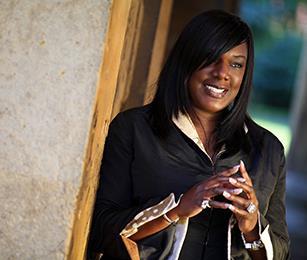
Founder and music director of Black Voices, Carol Pemberton was awarded an MBE in this year’s New Year’s Honours list. She talks to Alison Hull about the power of music and the increasing popularity of community singing.
A committed Christian, Carol established the all female a cappella ensemble in 1987, and it has gone from strength to strength ever since, performing for the Royal Family, Pope John Paul, Nelson Mandela and many other leaders, both religious and political. It is now her full-time occupation, but it all began in her local church.
I grew up in an evangelical church where my father was a reverend and later the national overseer. My earliest musical experiences – especially with regards to singing – were nurtured in church. At home, I learned to play the piano by literally sitting with one of my older brothers as he would prepare for his lessons.
In school I learned to play a number of wind instruments and the instrument I love most, the cello. It is also the instrument I think that greatly influenced the tone of my singing voice – earthy and rich (at least I’d like to think so!). Nowadays, just for pleasure, I play alto sax at every opportunity – a passion I discovered after learning that the fingering was similar to other wind instruments.
I started Black Voices after hearing Sweet Honey in the Rock in concert in Liverpool in the late 70s. I knew that the UK did not have a group that celebrated singing purely in the black oral tradition and I was used to building harmonies as a backing singer, and so the group grew out of these experiences. Being all female was pure accident, but after delivering our first performance as women and hearing feedback from members of the audience that we were a powerful and striking statement for females everywhere, both through our music and who we are, we saw no need to change the formula.
I think black gospel music is very powerful. For us, singing comes from a deep rooted and very spiritual place. Historically, singing had a very clear function. The message and delivery of a song or piece is most important. The emotion and conviction that singers like Black Voices deliver, comes from ‘a knowing’ from experience. We try never to sing songs that we do not understand or cannot connect with, and I’m sure it’s obvious where this is the case. Singing from a point of knowing is what makes messages believable to the listener and naturally evokes emotion and passion. It is this combination that gives music its power.
As well as singing for paying audiences, Black Voices do a lot of work in schools. Most of the programmes we deliver are about promoting singing in the black oral tradition. Often it’s about breaking down barriers that have been formed through fear of cultural differences and negative stereotypes that frequently go unchallenged. We are able to promote a range of themes – good citizenship, working together and tolerance, and to promote understanding – both of the development of black oral traditions, and the black presence here in the UK.
In our experience, young people enjoy learning about cultural differences; it helps them appreciate and see things from different perspectives.
I think singing has always been popular in this country, but an influx and increase in singing/talent shows has made it even more popular. Black Voices has worked with a range of community choirs here and abroad for over 25 years, but Gareth Malone’s Sing While You Work, along with many of the more mainstream talent shows, have led to an increased and heightened interest in singing countrywide. It’s now considered quite cool to sing and lately, the more unique your voice and style, the better. That’s great for Black Voices as we have always been considered different and outside of the norm. Hopefully that will mean that there is still longevity in the group!
I’ve been working in the area of music now for almost 30 years and I’ve seen a lot of changes. There seems to have been a shift in appreciation for live music and singing, and there is a growing return to artistry. As backing singers, over our 25 years, our voices have been used on many albums, backing tracks and in live recordings for many pop stars on TV and radio. One of the major, dramatic changes has been in our role as backing singers for major artistes. Whereas previously we would be called to sing live, nowadays our voices are pre-recorded and played on a backing track for live shows for pop acts. I’m sure it’s a good thing for the artistes, as they don’t pay for each live show; they just pay a fee for the recording and that will always be/sound exactly the same. But from our point of view, it’s yet another blow for live music.
It was a complete surprise to receive an MBE and be recognised for my contribution to music – but it is also really lovely. It is an overwhelming privilege, and greatly humbling. I could not have done it without the help of my daughter, family, supporters and others, so I’m extremely thankful and very happy!
Click here to find out more.



























